被动语态及其将来时 讲解
一般将来时被动语态

被动语态否定:主语+will/shall +not+ be+过去分词
被动语态疑问:will/shall +主语+be+过去分词?
(The Passive Voice)
动词过去分词的构成规则(与动词过去式构成规则一样) 1、一般在动词原形末尾加-ed,looked played 2、结尾是e的动词加-d , lived used 3、末尾只有一个辅音字母的重读闭音节词,先双写 这个辅音字母,再加-ed, planned tripped
一般将来时:主语+will + be+过去分词 The new school ______ when the new term begins. A. finishes B. will finish C. will be finished D. would finish
Can you try?
1.These films ___C___ until tomorrow morning.
3. I ____A__ if I finish the work.
A.shall be praised B. would praise
C. will praise D. praise 4. If it doesn’t rain tomorrow, the sports
meet ___C___ in the playground of our school.
4、结尾是“辅音字母+y”的动词,先变“y”为 “i” , 再加-ed , study---studied, carry--carried
知识点被动语态的用法
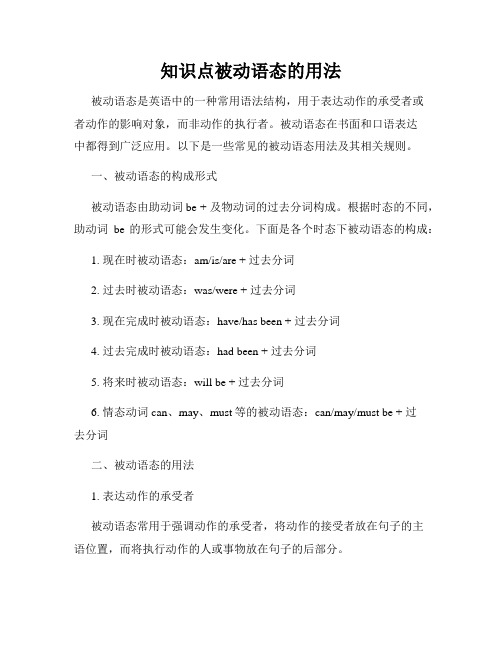
知识点被动语态的用法被动语态是英语中的一种常用语法结构,用于表达动作的承受者或者动作的影响对象,而非动作的执行者。
被动语态在书面和口语表达中都得到广泛应用。
以下是一些常见的被动语态用法及其相关规则。
一、被动语态的构成形式被动语态由助动词be + 及物动词的过去分词构成。
根据时态的不同,助动词be的形式可能会发生变化。
下面是各个时态下被动语态的构成:1. 现在时被动语态:am/is/are + 过去分词2. 过去时被动语态:was/were + 过去分词3. 现在完成时被动语态:have/has been + 过去分词4. 过去完成时被动语态:had been + 过去分词5. 将来时被动语态:will be + 过去分词6. 情态动词can、may、must等的被动语态:can/may/must be + 过去分词二、被动语态的用法1. 表达动作的承受者被动语态常用于强调动作的承受者,将动作的接受者放在句子的主语位置,而将执行动作的人或事物放在句子的后部分。
例句1:The house was built by my father.(这座房子是我父亲建的。
)例句2:The book was written by Mark Twain.(这本书是马克·吐温写的。
)2. 引起物体或地点的注意被动语态还可用于引起物体或地点的注意,使句子更加具体明确。
例句3:The cake was eaten.(蛋糕已被吃掉。
)3. 表达客观事实或普遍规律在叙述客观事实或阐述普遍规律时,被动语态经常被使用。
例句4:Math problems are solved step by step.(数学题是逐步解决的。
)例句5:English is spoken in many countries.(英语在许多国家中被使用。
)4. 句型转换有时,为了更好地表达句子的重点或强调动作的执行者,我们会从主动语态转换为被动语态。
初中英语语法——被动语态用法总结归纳

初中英语语法——被动语态用法总结归纳被动语态是英语语法中的重要部分,学好被动语态的用法可以帮助学生更准确地理解和使用英语。
下面是被动语态用法的详细总结归纳。
1.被动语态的构成:被动语态由“助动词be+过去分词”构成,根据时态的不同,助动词be的形式也会发生变化。
如:- 一般现在时:am/is/are + 过去分词- 一般过去时:was/were + 过去分词- 一般将来时:will be + 过去分词- 现在进行时:am/is/are being + 过去分词- 过去进行时:was/were being + 过去分词- 现在完成时:have/has been + 过去分词- 过去完成时:had been + 过去分词2.被动语态的用法:被动语态用来强调动作的承受者(主语)而不是执行者,并且常用于以下情景:2.1当我们不知道或不关心动作的执行者时。
例如:The cake was eaten.(蛋糕被吃了。
)2.2当动作的执行者已知,但我们要强调动作的承受者时。
例如:The house was built by my grandfather.(这座房子是我爷爷建的。
)2.3当我们要避免使用第一人称或第二人称时。
例如:Mistakes were made.(犯了错误。
)3.被动语态的注意事项:在使用被动语态时,需要注意以下几点:3.1表示动作的动词要用过去分词形式。
过去分词的形式有规律变化和不规律变化两种。
如:- 规律变化:原形 + ed,例如:played, watched, called- 不规律变化:需要记忆,例如:born, written, eaten3.2被动句的主语是动作的承受者,通常出现在句子的前面。
如:- 主动语态:I cooked dinner.(我做了晚饭。
)- 被动语态:Dinner was cooked by me.(晚饭是我做的。
)3.3 不及物动词不能构成被动语态。
不及物动词没有宾语,因此不能强调动作的承受者。
被动语态讲解
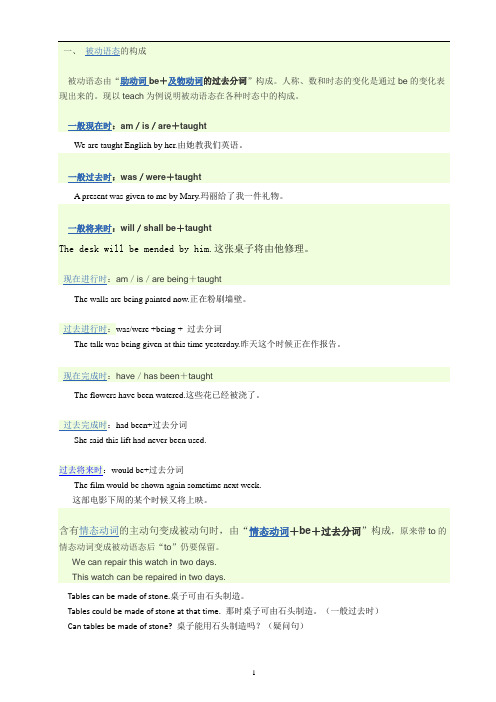
被动语态由“助动词be+及物动词的过去分词”构成。
人称、数和时态的变化是通过be的变化表现出来的。
现以teach为例说明被动语态在各种时态中的构成。
一般现在时:am/is/are+taughtWe are taught English by her.由她教我们英语。
一般过去时:was/were+taughtA present was given to me by Mary.玛丽给了我一件礼物。
一般将来时:will/shall be+taughtThe desk will be mended by him.这张桌子将由他修理。
现在进行时:am/is/are being+taughtThe walls are being painted now.正在粉刷墙壁。
过去进行时:was/were +being + 过去分词The talk was being given at this time yesterday.昨天这个时候正在作报告。
现在完成时:have/has been+taughtThe flowers have been watered.这些花已经被浇了。
过去完成时:had been+过去分词She said this lift had never been used.过去将来时:would be+过去分词The film would be shown again sometime next week.这部电影下周的某个时候又将上映。
含有情态动词的主动句变成被动句时,由“情态动词+be+过去分词”构成,原来带to的情态动词变成被动语态后“to”仍要保留。
We can repair this watch in two days.This watch can be repaired in two days.Tables can be made of stone.桌子可由石头制造。
Tables could be made of stone at that time. 那时桌子可由石头制造。
谓语动词的时态和语态:将来时,被动语态
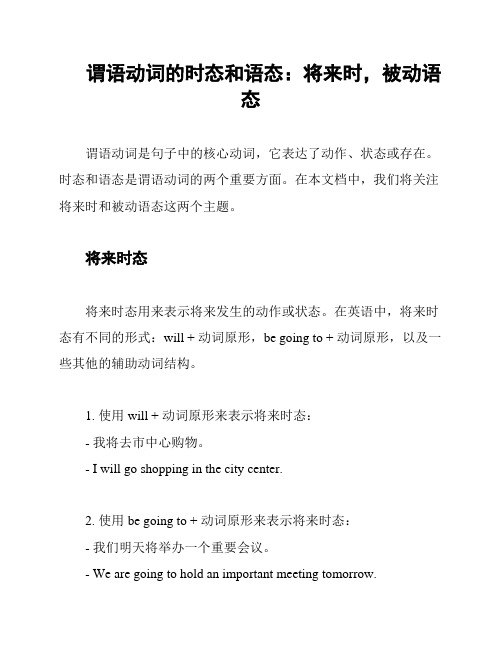
谓语动词的时态和语态:将来时,被动语态谓语动词是句子中的核心动词,它表达了动作、状态或存在。
时态和语态是谓语动词的两个重要方面。
在本文档中,我们将关注将来时和被动语态这两个主题。
将来时态将来时态用来表示将来发生的动作或状态。
在英语中,将来时态有不同的形式:will + 动词原形,be going to + 动词原形,以及一些其他的辅助动词结构。
1. 使用 will + 动词原形来表示将来时态:- 我将去市中心购物。
- I will go shopping in the city center.2. 使用 be going to + 动词原形来表示将来时态:- 我们明天将举办一个重要会议。
- We are going to hold an important meeting tomorrow.3. 其他辅助动词结构用来表示特定的将来动作或状态:- 我明天会正在吃午饭。
- I will be having lunch tomorrow.被动语态被动语态用于强调动作的接受者而不是执行者。
在被动语态中,谓语动词以一种形式变为动作的接受者。
被动语态的形式为:be + 过去分词。
1. 将主动语态转换为被动语态:- 主动语态:他吃了这个苹果。
- 被动语态:This apple has been eaten by him.2. 如果主动语态中有物主代词,需要将其作为被动语态的主语,并使用对应的被动语态动词形式:- 主动语态:我们修理了这辆车。
- 被动语态:This car was repaired by us.被动语态可以用来强调行为的接受者,或者在不知道或不关心动作执行者时使用。
总结谓语动词的时态和语态在句子中起着重要的作用。
将来时态用于表示将来发生的动作或状态,可以使用 will + 动词原形、be going to + 动词原形或其他辅助动词结构。
被动语态用于强调动作的接受者,可以通过将主动语态动词转换为 be + 过去分词的形式来表达。
被动语态全解
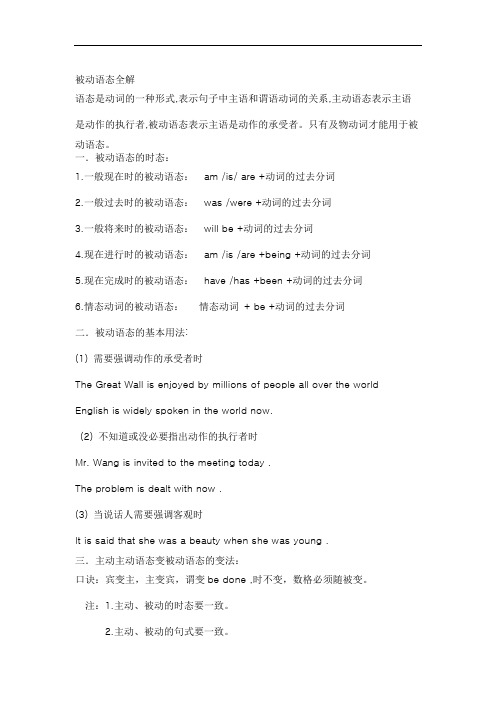
被动语态全解语态是动词的一种形式,表示句子中主语和谓语动词的关系,主动语态表示主语是动作的执行者,被动语态表示主语是动作的承受者。
只有及物动词才能用于被动语态。
一.被动语态的时态:1.一般现在时的被动语态:am /is/ are +动词的过去分词2.一般过去时的被动语态:was /were +动词的过去分词3.一般将来时的被动语态:will be +动词的过去分词4.现在进行时的被动语态:am /is /are +being +动词的过去分词5.现在完成时的被动语态:have /has +been +动词的过去分词6.情态动词的被动语态:情态动词+ be +动词的过去分词二.被动语态的基本用法:(1) 需要强调动作的承受者时The Great Wall is enjoyed by millions of people all over the world English is widely spoken in the world now.(2) 不知道或没必要指出动作的执行者时Mr. Wang is invited to the meeting today .The problem is dealt with now .(3) 当说话人需要强调客观时It is said that she was a beauty when she was young .三.主动主动语态变被动语态的变法:口诀:宾变主,主变宾,谓变be done ,时不变,数格必须随被变。
注:1.主动、被动的时态要一致。
2.主动、被动的句式要一致。
3.变成的被动语态的主语与谓语在单复数上保持一致。
语态转换不被动语态的步骤1, 把原主动句中的宾语转换为被动语态的主语2, 把动词改为被动语态形式即e+过去分词。
3, 原来主动语态句子中的主语,如果需要就放在by的后面以它的宾格形式出现(因为by是介词,后面需跟宾格作介词的宾语。
)以指明做事的人或物,如果没有必要,可以省略。
英语语法被动语态知识点梳理
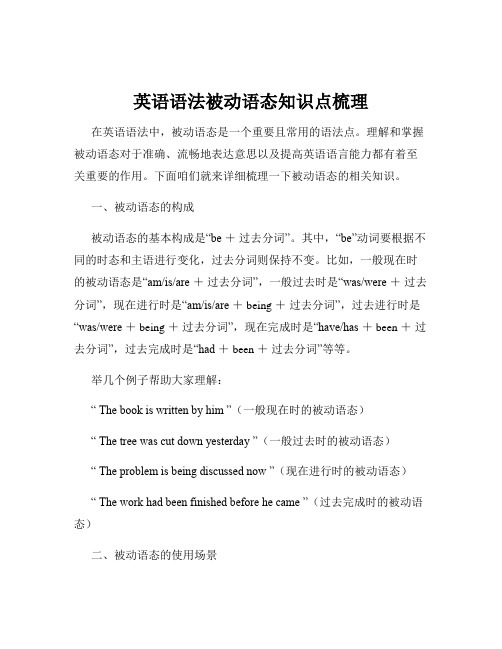
英语语法被动语态知识点梳理在英语语法中,被动语态是一个重要且常用的语法点。
理解和掌握被动语态对于准确、流畅地表达意思以及提高英语语言能力都有着至关重要的作用。
下面咱们就来详细梳理一下被动语态的相关知识。
一、被动语态的构成被动语态的基本构成是“be +过去分词”。
其中,“be”动词要根据不同的时态和主语进行变化,过去分词则保持不变。
比如,一般现在时的被动语态是“am/is/are +过去分词”,一般过去时是“was/were +过去分词”,现在进行时是“am/is/are + being +过去分词”,过去进行时是“was/were + being +过去分词”,现在完成时是“have/has + been +过去分词”,过去完成时是“had + been +过去分词”等等。
举几个例子帮助大家理解:“ The book is written by him ”(一般现在时的被动语态)“ The tree was cut down yesterday ”(一般过去时的被动语态)“ The problem is being discussed now ”(现在进行时的被动语态)“ The work had been finished before he came ”(过去完成时的被动语态)二、被动语态的使用场景1、不知道或没必要指出动作的执行者当我们关注的是动作本身而不是执行者时,就会使用被动语态。
例如:“The window was broken ”(不知道是谁打破了窗户)2、强调动作的承受者为了突出动作的承受者,会使用被动语态。
比如:“This song is loved by many people ”(强调很多人喜欢这首歌,而不是强调谁让很多人喜欢这首歌)3、出于礼貌或委婉在某些情况下,使用被动语态可以使表达更委婉、更礼貌。
比如:“It is suggested that you should come earlier ”(用被动语态比直接说“ We suggest that you should come earlier ”更委婉)三、主动语态变被动语态的方法1、把主动语态中的宾语变成被动语态的主语。
高考英语知识点解析被动语态的构成与用法
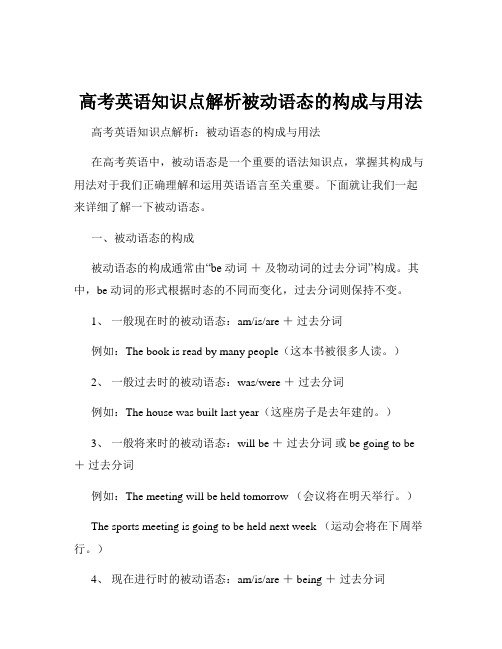
高考英语知识点解析被动语态的构成与用法高考英语知识点解析:被动语态的构成与用法在高考英语中,被动语态是一个重要的语法知识点,掌握其构成与用法对于我们正确理解和运用英语语言至关重要。
下面就让我们一起来详细了解一下被动语态。
一、被动语态的构成被动语态的构成通常由“be 动词+及物动词的过去分词”构成。
其中,be 动词的形式根据时态的不同而变化,过去分词则保持不变。
1、一般现在时的被动语态:am/is/are +过去分词例如:The book is read by many people(这本书被很多人读。
)2、一般过去时的被动语态:was/were +过去分词例如:The house was built last year(这座房子是去年建的。
)3、一般将来时的被动语态:will be +过去分词或 be going to be +过去分词例如:The meeting will be held tomorrow (会议将在明天举行。
)The sports meeting is going to be held next week (运动会将在下周举行。
)4、现在进行时的被动语态:am/is/are + being +过去分词例如:The problem is being discussed now (这个问题正在被讨论。
)5、过去进行时的被动语态:was/were + being +过去分词例如:The bridge was being repaired at that time (那时桥正在被修。
)6、现在完成时的被动语态:have/has been +过去分词例如:The work has been finished (工作已经完成了。
)7、过去完成时的被动语态:had been +过去分词例如:The task had been completed before I arrived (在我到达之前任务已经完成了。
被动语态的一般过去时、一般现在时、一般将来时
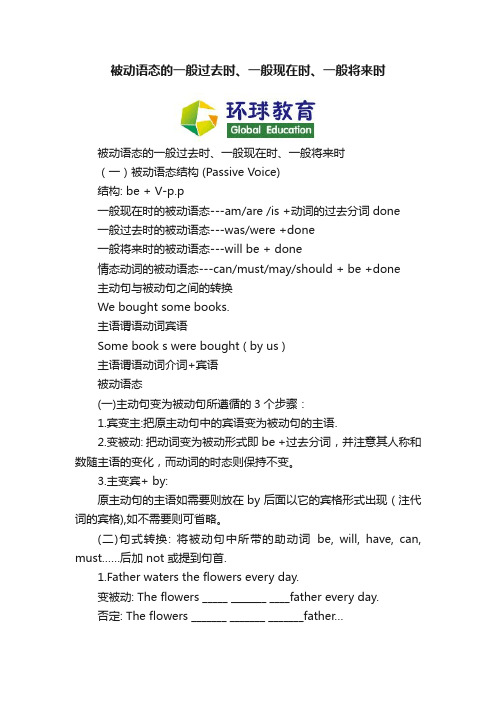
被动语态的一般过去时、一般现在时、一般将来时被动语态的一般过去时、一般现在时、一般将来时(一)被动语态结构 (Passive Voice)结构: be + V-p.p一般现在时的被动语态---am/are /is +动词的过去分词done一般过去时的被动语态---was/were +done一般将来时的被动语态---will be + done情态动词的被动语态---can/must/may/should + be +done主动句与被动句之间的转换We bought some books.主语谓语动词宾语Some book s were bought ( by us )主语谓语动词介词+宾语被动语态(一)主动句变为被动句所遵循的3个步骤:1.宾变主:把原主动句中的宾语变为被动句的主语.2.变被动: 把动词变为被动形式即be +过去分词,并注意其人称和数随主语的变化,而动词的时态则保持不变。
3.主变宾+ by:原主动句的主语如需要则放在by后面以它的宾格形式出现(注代词的宾格),如不需要则可省略。
(二)句式转换: 将被动句中所带的助动词be, will, have, can, must……后加 not 或提到句首.1.Father waters the flowers every day.变被动: The flowers _____ _______ ____father every day.否定: The flowers _______ _______ _______father…问句及答:_______the flowers_______ _______father every day?Yes, _______ _________.2. He cut the old tree yesterday.变被动: The old tree ______ _____ _____ ______ yesterday.否定: The old tree _____ _____ _____ ______....问句及答: _______the old tree ____ ____ _______ yesterday ? No, ________ ________.3. They will have a class meeting tomorrow.变被动: A class meeting_______ _______ ________ by them tomorrow. 划线提问: _______ _______the class meeting _______ _______ by them ?4. We should do something to stop the pollution.变被动: _______ ________ ________ ________to stop the pollution. 划线提问: ________ _________ ______ _________to stop the pollution ?5. Do people use Chinese only in China?变被动: _______Chinese_______ only in China ________people ?6. The lazy boy didn’t wash clothes yesterday.变被动: Clothes __________ ________ by the lazy boy yesterday.一般现在时1He often helps me in English.____________________________________2Lucy does her homework in the evening.____________________________________3They make shoes in that factory.____________________________________4.Do you water the flowers every day?____________________________________一般过去时1 We built our school 95 years ago.____________________________________2They planted many trees last year.____________________________________3He didn’t take the photo in 2003.____________________________________4.Did you finish your homework?____________________________________一般将来时1We will hold our National Games in Jinan.____________________________________2 I will invite my teacher to the party.____________________________________3 He won’t finish his homework in an hour.____________________________________4We must clean the classroom every day.____________________________________5Parents should allow the teenagers to choose their own clothes.____________________________________6Uncle Wang can’t mend his bike .含情态动词____________________________________一、谓语动词是由不及物动词加介词或副词构成的。
动词的一般将来时被动语态
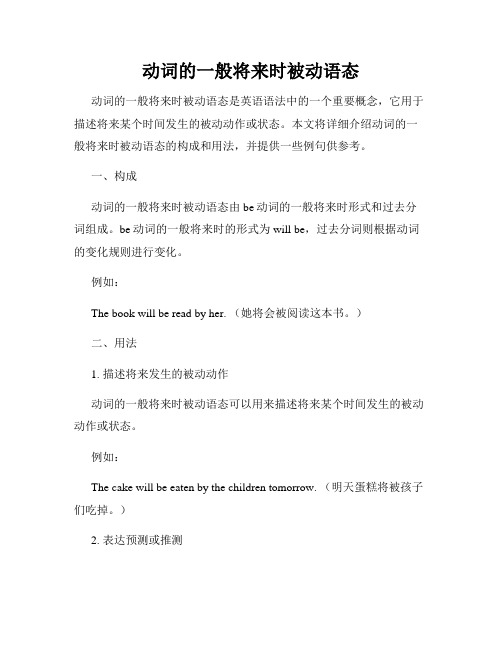
动词的一般将来时被动语态动词的一般将来时被动语态是英语语法中的一个重要概念,它用于描述将来某个时间发生的被动动作或状态。
本文将详细介绍动词的一般将来时被动语态的构成和用法,并提供一些例句供参考。
一、构成动词的一般将来时被动语态由be动词的一般将来时形式和过去分词组成。
be动词的一般将来时的形式为will be,过去分词则根据动词的变化规则进行变化。
例如:The book will be read by her. (她将会被阅读这本书。
)二、用法1. 描述将来发生的被动动作动词的一般将来时被动语态可以用来描述将来某个时间发生的被动动作或状态。
例如:The cake will be eaten by the children tomorrow. (明天蛋糕将被孩子们吃掉。
)2. 表达预测或推测动词的一般将来时被动语态还可以用来表达对将来事件的预测或推测。
例如:The concert will be attended by a large audience. (这场音乐会将会有很多观众参加。
)3. 提议或打算在某些情况下,动词的一般将来时被动语态可以用来表示提议或打算。
例如:The meeting will be held in the conference room. (会议将在会议室举行。
)三、例句1. The letter will be sent by John later. (信将会后来由约翰寄出。
)2. The house will be painted by a professional painter next week. (房子将由一名专业的画家在下周粉刷。
)3. The package will be delivered to your address tomorrow. (包裹将在明天送到你的地址。
)4. The project will be completed by the end of this year. (这个项目将在今年年底完成。
英语语法被动语态讲解

被动语态一、被动语态在各种时态中的结构一般现在时:be done(be随人称变化)一般过去时:was/were done一般将来时:will be done现在进行时:be being done(前面的be随人称变化,后面的being固定)过去进行时:was/were being done(being固定)现在完成时:have/has been done过去完成时:had been done过去将来时:would be done将来完成时:will have been done将来进行时:will be being done(being固定)将来完成进行时:will have been being done现在完成进行时:have been being done过去将来完成时:would have been done过去完成进行时:had been being done过去将来进行时:would be being done过去将来完成进行时:would have been being done二、被动语态的基本用法:被动语态表示一种主语和谓语之间的关系,当主语是动作的承受者时,就需要用到被动语态,汉语中所说的,“汽车被撞坏了”“钢笔被修好了” 等句子就是一种被动语态的句子,在汉语中常用“被”“由”等词来表示这种被动语态。
在英语中则用动词的被动语态形式来表示。
被动语态中还可用by 短语加在句后表示被动语态中动作的发出者。
也就是谓语动词动作的逻辑上的主语,被动语态常用在下列情况。
1、不知道谁是谓语动词动作的执行者时,或者没有必要说出谁是执行者时。
The glass was broken last night. 玻璃昨天被打破了。
His bike has been stolen. 他的自行车被偷了。
He was asked to go there once more. 他被要求再去那儿一次。
2、为了强调或突出动作的承受者时。
(完整版)一般将来时的被动语态
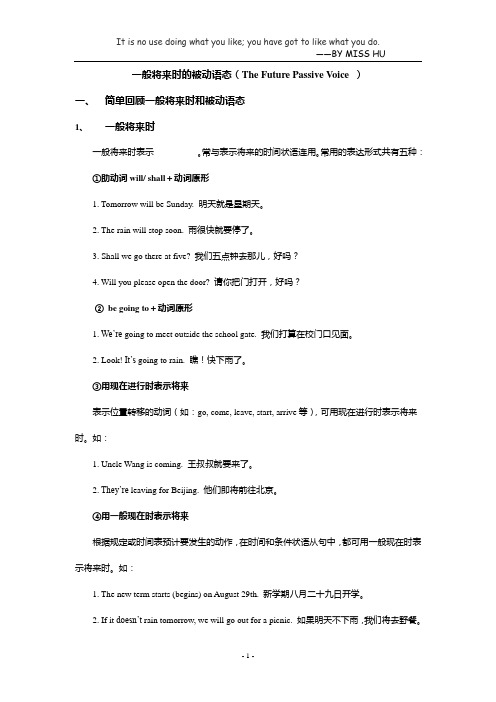
一般将来时的被动语态(The Future Passive Voice )一、简单回顾一般将来时和被动语态1、一般将来时一般将来时表示__________。
常与表示将来的时间状语连用。
常用的表达形式共有五种:①助动词will/ shall+动词原形1. Tomorrow will be Sunday. 明天就是星期天。
2. The rain will stop soon. 雨很快就要停了。
3. Shall we go there at five? 我们五点钟去那儿,好吗?4. Will you please open the door? 请你把门打开,好吗?②be going to+动词原形1. We’re going to meet outside the school gate. 我们打算在校门口见面。
2. Look! It’s going to rain. 瞧!快下雨了。
③用现在进行时表示将来表示位置转移的动词(如:go, come, leave, start, arrive等),可用现在进行时表示将来时。
如:1. Uncle Wang is coming. 王叔叔就要来了。
2. They’re leaving for Beijing. 他们即将前往北京。
④用一般现在时表示将来根据规定或时间表预计要发生的动作,在时间和条件状语从句中,都可用一般现在时表示将来时。
如:1. The new term starts (begins) on August 29th. 新学期八月二十九日开学。
2. If it doesn’t rain tomorrow, we will go out for a picnic. 如果明天不下雨,我们将去野餐。
⑤“be+动词不定式”或“be about to +动词原形”1. He is to visit Japan next year. 明年他将访问日本。
2. They’re about to leave. 他们就要走了。
英语被动语态语法讲解

初中被动语态语法讲解一语态分类英语动词有两种语态.,主动语态和被动语态.主动语态表示主语是动作的执行者,被动语态表示主语是动作的承受者.如:They will build a new bridge over the river. 主动A new bridge will be built over the river. 被动汉语中常用“被”、“给”、“由”、“受”等词用来表示被动,而英语用:助动词be + 及物动词的过去分词构成.二被动语态的时态、人称和数的变化主要体现在be的变化上,其形式与系动词be的变化形式完全一样.以 give 为例,列表如下:一般现在时:am / is / are + done 一般过去时:was / were + done 一般将来时:shall / will + be done 一般过去将来时:should / would + be done现在进行时:am / is / are + being + done 过去进行时:was / were + being + done现在完成时:have / has + been + done 过去完成时:had + been + done 将来完成时:shall /will + have been + done 过去将来完成时:should / would + have been + done[注]被动语态没有将来进行时和过去将来进行时.三常见的八种时态中的被动语态1. 一般现在时:1People grow rice in the south of the country.2The school doesn't allow us to enter lab without a teacher.2. 一般过去时:1They agreed on building a new car factory last month.2The students didn't forget his lessons easily.3. 一般将来时:1They will send cars abroad by sea.2They will give plenty of jobs to school-leavers.5. 现在进行时:1The radio is broadcasting English lessons.2 We are painting the rooms.6. 过去进行时:1The workers were mending the road.2This time last year we were planting trees here.7. 现在完成时:1Someone has told me the meeting might be put off.2He has brought his book here.四含有情态动词的被动语态:含有情态动词的被动语态是由“情态动词+ be+及物动词的过去分词”构成.1Youmust hand inyour homework after class.2Hecan writea letter with the computer.五被动语态的使用1.当不知道或没有必要指出动作的执行者时,常用被动语态,这时往往不用by短语.“Mr. White, the cup was broken after class. ”2.突出或强调动作的承受者,如果需要说出动作的执行者,用by短语.These records were made by John Denver. The cup was broken by Paul.3.当主语既不是动作的执行者,也不是动作的承受者时,这时常用in +名词作状语,而代替 by短语.These cars were made in China.六主动语态变被动语态的方法1My auntinvitedmeto her dinner party. 主语谓语宾语→Iwas invitedbymy aunt to her dinner party. 主语谓语宾语2The schoolset up a special class to help poor readers.→A special class to help poor readers was set up in the school.1.把主动语态的宾语变成被动语态的主语.2.把主动语态的谓语变成被动语态的be +过去分词,时态要与原句保持一致.3.把主动语态的主语变为介词by的宾语,放在被动语态里谓语动词之后,by短语可以省略.如果原句主语是地点名词,在被动语态中用in +地点名词作状语.七语态转换时所注意的问题1.把主动语态变为被动语态,其谓语动词的时态要与原句时态保持一致,其谓语动词的数要与新主语保持一致.We have bought a new new computer has been new computer have been bought.错误2.含有双宾语的主动句变被动句时,可分别将其中的一个宾语变为主语,另一个不动,一般变间接宾语为主语时比较多My uncle gave me a present on my birthday.I was given a present on my birthday.如果把直接宾语指物改为主语,则在间接宾语指人前加适当的介词,如上句还可以说:A present was given to me yesterday.注意:1.一般在下列动词后,常在间接宾语前用介词 to,如:bring, give, hand, lend, offer, pass, pay, promise, sell, show, take, teach, tell等.1 The book was showed to the class.2 My bike was lent to her.2.一般在下列动词后,间接宾语前用介词 for,如:build, buy, cook, cut, choose, do, fetch, find, fix, get, keep, make, order, paint, play, sing等.1 A new skirt was made for me.2 The meat was cooked for us.3 Some country music was played for us.3.由动词+介词或副词构成的短语动词,要把它们作为整体看,即把它们看成一个及物动词,介词或副词不可拆开或漏掉.这类动词有:不及物动词+介词,如: agree to, ask for, laugh at, operated on, listen to, look after, think of, talk about 等.The patient is being operated on. The problem is solved. It needn't be talked about.及物动词+副词:如:bring about, carry out, find out, give up, hand in, make out, pass on, point out, put away, put off, think over, turn down, work out, turn out等.His request was turned down.The sports meet will be put off because of the bad weather4.带复合宾语宾语+宾补的动词改为被动语态时,一般把主动结构中的宾语改为主语,而宾语补足语保留在谓语动词后面.如:1 We always keep the classroom clean.→The classroom is always kept clean.2 She told us to follow her instructions.→We were told to follow her instructions.注意:在see, watch, hear, notice, listen to, look at, make, feel等动词后作宾语补足语的动词不定式都不带 to,但改成被动语态后都带to,这时不定式为主语补足语,也就是说不定式作主语补足语不存在省略to的问题.We often hear him play the guitar.→He is often heard to play the guitar.5.当主动句的主语是nobody, no one等含有否定意义的不定代词时,被动句中将其变为anybody,作by的宾语,并将谓语动词变为否定的被动语态.如:Nobody can answer this question.误:The question can be answered by nobody. 正:The question can not be answered by anybody.6.当否定句中的宾语是anything, anybody, anyone等不定代词时,在被动句中应将其分别变为nothing, nobody, no one作主语,并将谓语动词变为肯定的被动语态.如:They haven't done anything to make the river clean.误:Anything hasn't been done to make the river clean.正:Nothing has been done to make the river clean.7.以who为主语开头的疑问句,变被动时,用by whom放在句首:Who wrote the story 误:Who was the story written 正:By whom was the story written8.有些动词既是及物又是不及物,当它们和well, badly, easily等副词连用时,表示主语内在品质或性能,是不及物动词,用主动表示被动,这时不用被动语态,常见的有:write, read, clean, sell, wash, cook等.如:1The cloth washes easily.这布很好洗.2The new product sells well.这新产品很畅销.对比:The books sell well. 主动句The books were sold out. 被动句The meat didn’t cook well. 主动句The meat was cooked for a long time. 被动句9.下列情况主动句不能改为被动句:第一,感官系动词一般用主动形式表示被动意义,如:feel,look, seem, taste, sound, remain等.1—Do you like the material—Yes, it feels very soft. 误:It is felt very soft.2The food tastes delicious. 误:The food is tasted delicious.3The pop music sounds beautiful. 误:The pop music is sounded beautiful.第二,谓语是及物动词leave, enter, reach, suit, have, benefit, lack, own 等.如:He entered the room and got his book. 误:The room was entered and his book was got.She had her hand burned. 误:Her hand was had burned.第三,一些不及物动词短语没有被动语态:take place, break out, belong to, lose heart, consist of, add up to等.The fire broke out in the capital building. 误:The fire was broke out in the capital building.第四,不及物动词没有被动语态,如:rise, happen, succeed, remain, lie等.When we got to the top of the mountain, the sun had already risen.误:The sun had already been risen.After the earthquake, few houses remained. 误:After the earthquake, few houses were remained.第五,宾语是反身代词,相互代词,同源宾语,不定式,v-ing形式及抽象名词等,不能变为被动句子的主语,如:I taught myself English. 误:Myself was taught English.We love each other. 误:Each other is loved.10.在汉语中,有一类句子不出现主语,在英语中一般可用被动结构来表示,例如:据说……It is said that …据报导……It is reported that …据推测……It is supposed that …希望……It is hoped that …众所周知……It is well known that …普遍认为……It is generally considered that …有人建议……It is suggested that …1 It is reported that it is going to rain tomorrow.2 It is well known that Thomas Edison invented the electric lamp.。
一般现在时和一般将来时的被动语态结构
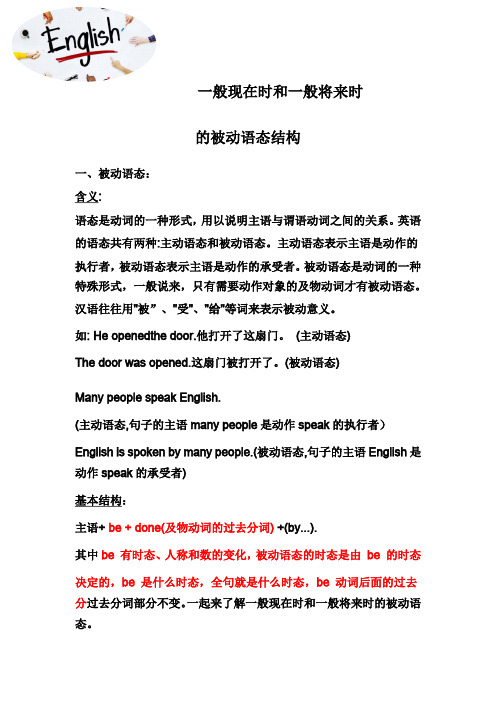
一般现在时和一般将来时的被动语态结构一、被动语态:含义:语态是动词的一种形式,用以说明主语与谓语动词之间的关系。
英语的语态共有两种:主动语态和被动语态。
主动语态表示主语是动作的执行者,被动语态表示主语是动作的承受者。
被动语态是动词的一种特殊形式,一般说来,只有需要动作对象的及物动词才有被动语态。
汉语往往用"被”、"受"、"给"等词来表示被动意义。
如: He openedthe door.他打开了这扇门。
(主动语态)The door was opened.这扇门被打开了。
(被动语态)Many people speak English.(主动语态,句子的主语many people是动作speak的执行者)English is spoken by many people.(被动语态,句子的主语English是动作speak的承受者)基本结构:主语+ be + done(及物动词的过去分词) +(by...).其中be 有时态、人称和数的变化,被动语态的时态是由be 的时态决定的,be 是什么时态,全句就是什么时态,be 动词后面的过去分过去分词部分不变。
一起来了解一般现在时和一般将来时的被动语态。
二、一般现在时和一般将来时的被动语态结构1.一般现在时被动语态结构:肯定句:主+is/am/are +及物动词过去分词+其他.否定句:主+is/am/are+not +及物动词过去分词+其他一般疑问句:ls/Am/Are +主+及物动词过去分词+其他?特殊疑问句:特殊疑问词+is/am/are +主及物动词过去分词+其他?如:English is taught in most schools.大多数学校都教英语。
The children are not allowed to play on the grass.孩子们不允许在草地上玩耍。
Is a recorder used in our English class every day?英语课每天用录音机吗?2.一般将来时的被动语态结构:如:A talk will be given soon.很快要作报告。
初中英语知识点归纳被动语态的时态和语态变化总结
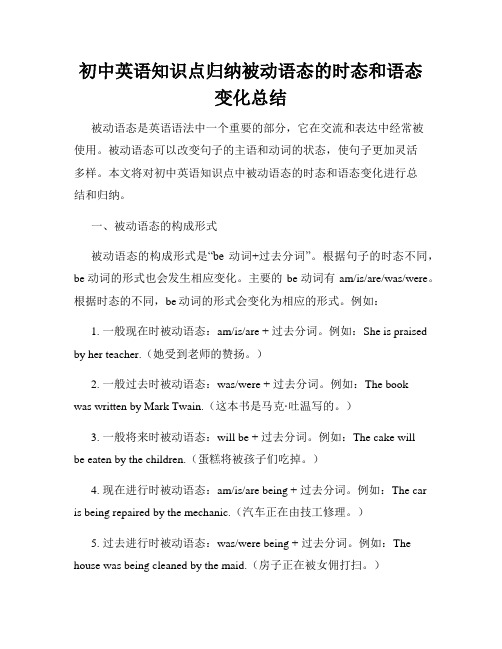
初中英语知识点归纳被动语态的时态和语态变化总结被动语态是英语语法中一个重要的部分,它在交流和表达中经常被使用。
被动语态可以改变句子的主语和动词的状态,使句子更加灵活多样。
本文将对初中英语知识点中被动语态的时态和语态变化进行总结和归纳。
一、被动语态的构成形式被动语态的构成形式是“be动词+过去分词”。
根据句子的时态不同,be动词的形式也会发生相应变化。
主要的be动词有am/is/are/was/were。
根据时态的不同,be动词的形式会变化为相应的形式。
例如:1. 一般现在时被动语态:am/is/are + 过去分词。
例如:She is praised by her teacher.(她受到老师的赞扬。
)2. 一般过去时被动语态:was/were + 过去分词。
例如:The bookwas written by Mark Twain.(这本书是马克·吐温写的。
)3. 一般将来时被动语态:will be + 过去分词。
例如:The cake willbe eaten by the children.(蛋糕将被孩子们吃掉。
)4. 现在进行时被动语态:am/is/are being + 过去分词。
例如:The car is being repaired by the mechanic.(汽车正在由技工修理。
)5. 过去进行时被动语态:was/were being + 过去分词。
例如:The house was being cleaned by the maid.(房子正在被女佣打扫。
)二、被动语态的时态变化被动语态的时态变化取决于主动语态句子的时态,根据时态的不同,be动词和过去分词的形式也会相应变化。
以下是常见时态的被动语态变化:1. 一般现在时:am/is/are + 过去分词。
例如:The game is played by the students.(比赛被学生们进行。
)2. 现在进行时:am/is/are being + 过去分词。
高中英语一般将来时的被动语态知识点分析

高中英语一般将来时的被动语态知识点分析高中英语会学到很多的知识点,下面店铺的小编将为大家带来该哦中英语的被动语态的知识点的介绍,希望能够帮助到大家。
高中英语一般将来时的被动语态知识点一般将来时的被动语态是被动语态学习中的难点,也是重点。
本文通过对若干典型例题的分析,对其进行了归纳和总结,希望对同学们有所帮助。
1. 基本结构一: shall/will + be + done【经典例题1】I promise that this matter _____ next week. A. will be taken care B. will take care ofC. will take good careD. will be taken care of【思路点拨】选D。
从题干不难看出,一是从句中的this matter 和 take care of 是被动关系;二是take care of 是固定搭配,不能拆开;三是相对于promise来说,take care of 是将要发生的动作。
故从句谓语应用一般将来时的被动语态。
【经典例题2】These dictionaries _____ the library again (by you ). A. will be taken out of B. won’t be taken out of C. will take out of D. won’t take out of【思路点拨】选B。
由题干结构及句意可知,此题考查的是一般将来时的被动语态的否定式。
另外,我们还应注意:其疑问式为Shall/Will + 主语 + be + done...? 或特殊疑问词 + shall/will + 主语 + be + done...?2. 基本结构二: be(am / is /are)going to + be + done【经典例题1】The class ____ on everything they have learnt this year. A. is going to be examining B. are going to examine C. is going to be examined D. are going to be examined【思路点拨】选D。
一般将来时的被动语态

一般将来时的被动语态1. 什么是一般将来时的被动语态一般将来时的被动语态是指在将来发生的动作或状态下,主语承受动作或承受状态。
被动语态的结构为:will be + 过去分词。
2. 一般将来时的被动语态的构成一般将来时的被动语态的构成如下:- 肯定句:主语 + will be + 过去分词- 否定句:主语 + will not be + 过去分词- 疑问句:Will + 主语 + be + 过去分词 + ?3. 一般将来时的被动语态的使用情况一般将来时的被动语态通常用于以下情况:- 描述将来的预测、计划或安排- The meeting will be held next week. (会议将于下周举行。
)- The house will be renovated next month. (房子将在下个月进行翻修。
)- 描述某人对将来事件的预测或判断- The movie will be loved by audiences. (这部电影将会受到观众的喜爱。
)- The new product will be well received in the market. (这个新产品将在市场上受到好评。
)- 描述按计划或安排将要发生的动作或事件- The report will be submitted before the deadline. (报告将会在截止日期之前提交。
)- The package will be delivered to your address tomorrow. (包裹将于明天送到您的地址。
)4. 小结一般将来时的被动语态是在将来发生的动作或状态下,主语承受动作或承受状态的语态形式。
它的构成为:will be + 过去分词。
一般将来时的被动语态通常用于描述将来的预测、计划或安排,某人对将来事件的预测或判断,以及按计划或安排将要发生的动作或事件。
过去将来时结构和被动语态
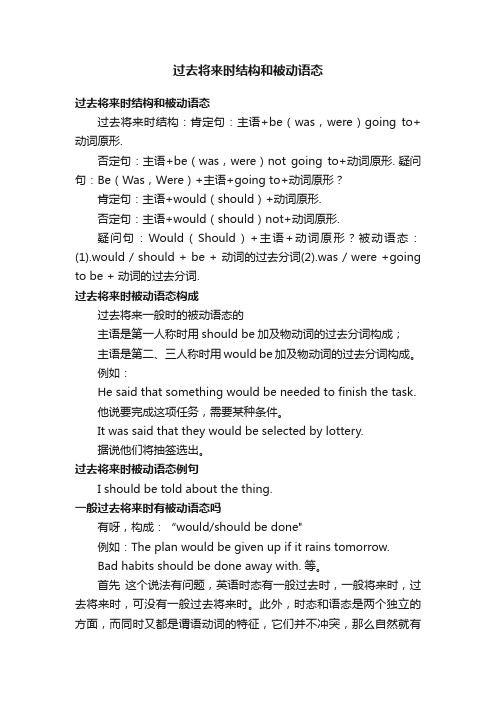
过去将来时结构和被动语态过去将来时结构和被动语态过去将来时结构:肯定句:主语+be(was,were)going to+动词原形.否定句:主语+be(was,were)not going to+动词原形. 疑问句:Be(Was,Were)+主语+going to+动词原形?肯定句:主语+would(should)+动词原形.否定句:主语+would(should)not+动词原形.疑问句:Would(Should)+主语+动词原形?被动语态:(1).would / should + be + 动词的过去分词(2).was / were +going to be + 动词的过去分词.过去将来时被动语态构成过去将来一般时的被动语态的主语是第一人称时用should be加及物动词的过去分词构成;主语是第二、三人称时用would be加及物动词的过去分词构成。
例如:He said that something would be needed to finish the task.他说要完成这项任务,需要某种条件。
It was said that they would be selected by lottery.据说他们将抽签选出。
过去将来时被动语态例句I should be told about the thing.一般过去将来时有被动语态吗有呀,构成:“would/should be done"例如:The plan would be given up if it rains tomorrow.Bad habits should be done away with. 等。
首先这个说法有问题,英语时态有一般过去时,一般将来时,过去将来时,可没有一般过去将来时。
此外,时态和语态是两个独立的方面,而同时又都是谓语动词的特征,它们并不冲突,那么自然就有一般过去时的被动语态,或者过去将来时的被动语态。
- 1、下载文档前请自行甄别文档内容的完整性,平台不提供额外的编辑、内容补充、找答案等附加服务。
- 2、"仅部分预览"的文档,不可在线预览部分如存在完整性等问题,可反馈申请退款(可完整预览的文档不适用该条件!)。
- 3、如文档侵犯您的权益,请联系客服反馈,我们会尽快为您处理(人工客服工作时间:9:00-18:30)。
被动语态及其将来时讲解概念引入:被动语态是动词或动词短语所涉及到宾语作主语时所使用的形式。
先看下面句子:The Mid-Autumn Festival is celebrated by Chinese people all over the world.全世界的中国人都过中秋节。
In one story, lanterns were lit to celebrate the power of light over darkness.在一个故事中,点灯笼来颂扬光明战胜黑暗的威力。
The theatre is being built in the centre of the city.这家剧院正在市中心建造。
We shall be punished if we break the rule.如果我们违反规定,我们将要受到惩罚。
The meeting won’t be held tomorrow. 明天不再举行会议。
Won’t water be turned into ice, it is below freezing?如果气温在冰点之下,水难道不会变成冰吗?When will these books be published? 这些书将在什么时候被出版?这些句子都是被动语态,其中第一句是一般现在时,第二句是一般过去时,第三句是现在进行时,其它四个句子都是一般将来时,时态和语态是英语中最重要的语法项目之一,也是英语学习必须学会的难点,本单元我们将复习和学习被动语态的有关知识。
语法点拨被动语态:概念和使用I. 概念1. 英语中有两种语态:主动语态和被动语态。
主语是动作的发出者,谓语动词用主动语态;主语是动作的承受者,谓语动词用被动语态。
英语的语态是通过动词形式的变化表现出来的。
许多人说汉语。
Many people speak Chinese. (谓语speak 的动作是由主语many people 做的,主动语态)Chinese is spoken by many people. (主语English 是动词speak 的承受者,被动语态)2. 被动语态常用by 引出动作的执行者或施加者,以强调动作的执行者。
By whom is the book written? 这本书是谁写的?The children were driven indoors by the rain. 孩子们被雨赶进了室内。
II. 使用被动语态的场合1. 当关注的是事情或事物本身而不是动作的执行者,或者根本不知道动作的执行者时。
My mobile phone has been stolen. 我的电话被偷走了。
2. 动作的执行者很明确时或强调承受者时。
I was given ten minutes to decide whether I should accept the offer.我有十分钟来决定是否接受这个提议。
3. 当动作的执行者是“people”或“one”时。
He is believed to have lied to the police. 人们都认为他向警察撒了谎。
4. 为了更好地安排句子。
The well-known person got on the bus and was immediately recognized by people.那个名人上了公交车,立刻被人们认了出来。
(只需一个主语)被动语态的构成和时态变化I. 基本结构1. be + 过去分词Such songs are usually sung by girls. 这些歌通常是女孩子们唱的。
The window was broken by my son. 窗子是我儿子打破的。
2. 变化的原则被动语态的所有的变化中done 必须是保留的,而时态要通过be 的变化而体现的。
Were many trees planted on the hill yesterday 昨天山上种了许多树吗?When shall we be given a lecture on the Internet 什么时候给我们作有关因特网的讲座?The classroom is being cleaned now. 教室现在正在被打扫。
3. 被动语态的时态变化(谓语动词):一般进行完成现在am/is/are done am/is/are being done has/have been done过去was/were done was/were being done had been done将来shall/will be done shall/will be being done shall/will have been done记住:把be 做相对应的变化来改变时态。
例句:(2015 天津高考) No pets except fish are permitted in student rooms. (一般现在时)除了鱼以外,宠物不允许带进学生的房间。
Are the babies being taken care of by this nurse (现在进行时)这些婴儿正由这个护士照看吗?How much money was stolen in all (一般过去时)一共被偷了多少钱?The classroom looks tidy. It has been cleaned. (现在完成时)教室看起来很整洁。
它已经被打扫了She asked whether their plan would be considered with great care. (过去将来时)她问他们的计划会不会得到仔细的考虑。
4. 被动语态的否定句和疑问句1)被动语态的否定形式是在第一个助动词、情态动词或be 动词后加not。
2)被动语态的疑问句形式是把第一个助动词、情态动词或be 动词提前。
Has a new training centre been set up in our town? 我们镇上新的培训中心建好了吗?This task won’t be finished next month. 下个月这项任务不会完成。
一般将来时的被动语态I. 使用的场合如果一个动作在将来某个时间发生或持续,且句子的主语又是该动作的承受者,那就要用一般将来时的被动语态。
一般将来时中常有tomorrow, next year, in two hours, after three o’clock 等时间状语。
1. 表示根据计划或者安排将要发生的被动性动作。
This work will be done at once. 这项工作将立即完成。
Those books will be published next month. 那些书将于下月出版。
The bridge will be finished next month. 这座桥将于下个月完工。
The problem is going to be discussed at the meeting. 那个问题将在会上讨论。
2. 表示有固定性条件就有规律性被动结果。
Heated to 100℃, water will be turned into steam.加热到100 度时,水将会变成蒸汽。
If you speak in class, you will be punished.如果你在课堂上讲话,你将会受到惩罚。
II. 四种主要形式:1. will/shall+ be done:The new film will be shown next Thursday. 这部新电影将在下周四上映。
This building will be finished next year. 这幢楼将于明年完工。
2. be going to +be done(表示按计划、安排等即将发生的被动行为):The sports meeting is going to be held on April 10. 运动会将于四月十日举行。
A new factory is going to be built in our city. 一个新工厂将在我市建成。
3. be to +be done(表示按计划中的约定或责任、义务和要求必须做的被动动作):The problem is to be discussed at the meeting tomorrow. 这个问题将在明天的会上讨论。
4. be about to be done(表示某事马上就要发生,后不接时间状语)An answer is about to be given to you. 马上给你答复。
注意:1. 在时间、条件状语从句中, 也用一般现在时的被动语态代替一般将来时的被动语态。
If I am given enough time, I will go to Japan for my holiday.如果我有足够的时间,我要去日本度假。
2. 一般将来时的被动语态的否定式、疑问式1)上述四种形式的中的第一种:直接在will/ shall 后加not 或将will/shall 提前构成一般疑问句,其简略回答保留will/ shall。
This bridge will be built soon, won’t it? 这座桥很快将被建成,是吗?Won’t water be turned into ice, if it is below freezing?如果气温在冰点一下,水难道不会变成冰吗?2)后三种形式:be 后直接加not。
Is my homework to be finished in ten minutes? 我的家庭作业必须在10 分钟内完成吗?主动变被动:一般规律和有情态动词的情况I. 一般规律All the people laughed at him. 所有人都嘲笑他。
→He was laughed at by all the people. 他被所有人嘲笑They make the bikes in the factory. 他们在工厂生产自行车。
→The bikes are made by them in the factory. 这些自行车被他们在工厂生产。
They sold out the tickets. 他们卖完了票。
→The tickets were sold out. 票被卖光了。
规则:1. 把主动语态的宾语变为被动语态的主语。
2. 把谓语变成被动结构(be+过去分词)3. 把主动语态中的主语放在介词by 之后做宾语,将主格改为宾格。
II. 含有情态动词的被动语态构成:情态动词+be+过去分词We can repair this watch in two days. 两天内我们能修好这钟表。
